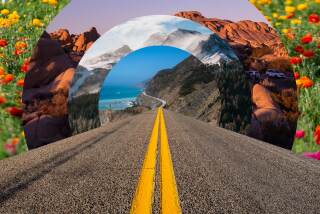On the road again, somehow
- Share via
It’s summertime, and the gas prices are sky high.
The Travel Industry Assn. is forecasting only a slight 1% decline in the number of vacations Americans will take this summer as compared to last. But not everyone is so sanguine about the future of American mobility. Some oil industry experts are predicting an end to the classic summer road trip.
That would be a terrible shame. Not just because it’d be a loss of a phenomenal form of recreation, but because taking to the open road has long been Americans’ route to discovering not only their country but themselves.
Our love of the road is not simply a product of the explosion in automobile ownership in the post-World War II era. And its attendant literary genre didn’t begin -- or end -- with Jack Kerouac’s 1951 Beat classic, “On the Road.” Way back in 1900, Walt Whitman published his poem, “The Song of the Open Road,” in “Leaves of Grass.” In it, he explores the almighty American itch to venture forth.
From this hour, freedom!
From this hour I ordain myself loos’d of limits and imaginary lines,
Going where I list, my own master, total and absolute,
Listening to others, and considering well what they say,
Pausing, searching, receiving, contemplating,
Gently, but with undeniable will, divesting myself of the holds that would hold me.
And wasn’t that the very desire that launched the great American Experiment in the first place -- to divest ourselves of whatever held us? At the very least, from the founding of the first colonies on the Eastern Seaboard, we like to think that we’ve never ceased running from hidebound convention and tradition.
As early as the 1780s, Ben Franklin suggested that the westward movement of the population would save Americans from the corrosive remnants of European tradition that had taken hold on the East Coast. From the late 1830s, Horace Greeley began urging the downtrodden to “Go West, young man!” to find fortune. Until it was deemed closed in the late 19th century, the Western frontier was the mythic national safety valve that promised to save us from poverty, stasis and our worst mistakes. There’s a reason why Huck Finn decides to light out for the territory.
The contemporary road trip takes the memory of all that, adds faster transportation and a lot of nostalgia. It simultaneously represents two essential -- and competing -- facets of American life. On one hand, taking to the road is a metaphor for rejecting conformity, searching for the new. It’s also a way “home.”
In fact, self-discovery has been a prominent theme in so many road narratives. Think of Robert M. Pirsig’s 1974 bestseller, “Zen and the Art of Motorcycle Maintenance,” a road book punctuated by philosophical musings on life. Then there’s William Saroyan’s famous observation that “psychiatry of one sort or another is what happens on a long drive.”
Through the years, the road trip has also become something of a rite of passage. In 1988, the summer before my senior year of college, I joined three buddies on a 10-day journey from Berkeley to Princeton. We piled into David Schrayer’s four-door, six-cylinder 1958 baby blue Ford Custom, the blue-collar version of the Fairlane. We didn’t quite wander aimlessly, but almost. Our trip also had a theme. We stopped to play basketball when a court presented itself and to watch that year’s NBA finals between the Lakers and the Pistons.
An old guy in a bar in Las Vegas, N.M., still owes me money (I bet on the Lakers in game 2, he bet on the Pistons). Some burly kids in Alabama really wiped the floor with us in a pick-up game. I remember lying in the road in Death Valley, looking up at the stars. I also remember calling my big brother on Day Five to complain that I couldn’t stand being cramped up in a car with those guys for one more day.
The 2008 road-trip-not-taken will undoubtedly be a result of the high cost of a barrel of light sweet crude this summer. Then again, the car isn’t the only way to travel (an early editor at this newspaper, Charles Lummis, walked from Ohio to L.A. in 143 days), and gasoline isn’t the only fuel that can take us from here to there. Maybe another national stereotype -- American ingenuity -- will finally kick in and get us all back on the road, where we belong. In Whitman’s words: The road is before us. .../ Be not detained.
More to Read
Sign up for The Wild
We’ll help you find the best places to hike, bike and run, as well as the perfect silent spots for meditation and yoga.
You may occasionally receive promotional content from the Los Angeles Times.






